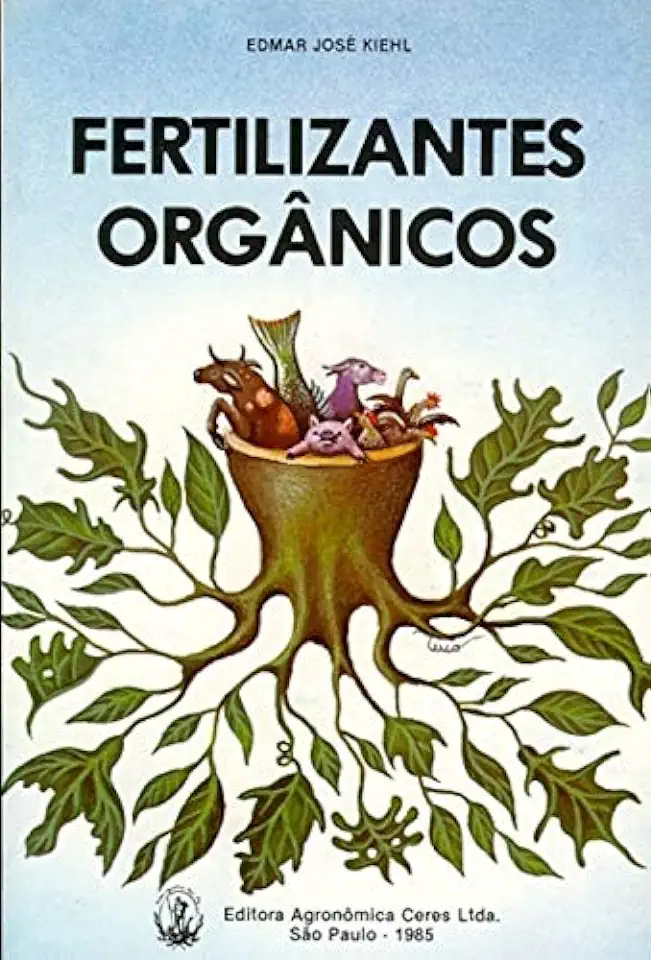
Organic Fertilizers - Edmar José Kiehl
Organic Fertilizers: The Key to Sustainable Agriculture
In "Organic Fertilizers", renowned agronomist Edmar José Kiehl provides a comprehensive guide to the use of organic fertilizers in sustainable agriculture. Drawing on decades of research and practical experience, Kiehl presents a compelling case for the adoption of organic farming practices as a means of improving soil health, increasing crop yields, and reducing environmental pollution.
The Importance of Organic Fertilizers
Organic fertilizers are derived from plant and animal materials, and they provide a number of benefits over synthetic fertilizers. These benefits include:
- Improved soil structure: Organic fertilizers help to improve soil structure by increasing the amount of organic matter in the soil. This organic matter helps to hold the soil together, preventing erosion and improving drainage.
- Increased nutrient availability: Organic fertilizers release nutrients slowly over time, making them more available to plants. This helps to prevent nutrient deficiencies and promotes healthy plant growth.
- Reduced environmental pollution: Organic fertilizers do not pollute the environment like synthetic fertilizers. They do not contribute to water pollution or greenhouse gas emissions, and they can actually help to reduce these problems.
Types of Organic Fertilizers
There are many different types of organic fertilizers available, each with its own unique benefits. Some of the most common types of organic fertilizers include:
- Compost: Compost is a mixture of decomposed plant and animal materials. It is a rich source of organic matter, nutrients, and beneficial microorganisms.
- Manure: Manure is the waste produced by animals. It is a valuable source of organic matter, nutrients, and microorganisms.
- Green manure: Green manure is a crop that is grown specifically to be plowed under and incorporated into the soil. It is a good source of organic matter, nutrients, and nitrogen.
- Bone meal: Bone meal is a ground-up mixture of animal bones. It is a good source of phosphorus and calcium.
- Blood meal: Blood meal is a dried powder made from animal blood. It is a good source of nitrogen.
- Fish emulsion: Fish emulsion is a liquid fertilizer made from fish scraps. It is a good source of nitrogen and phosphorus.
How to Use Organic Fertilizers
Organic fertilizers can be used in a variety of ways. Some of the most common methods of application include:
- Topdressing: Topdressing is the application of organic fertilizers to the surface of the soil. This is a good way to provide nutrients to plants that are already growing.
- Side dressing: Side dressing is the application of organic fertilizers to the soil around the base of plants. This is a good way to provide nutrients to plants that are actively growing.
- In-furrow application: In-furrow application is the application of organic fertilizers to the furrow at the time of planting. This is a good way to provide nutrients to seedlings and young plants.
Benefits of Using Organic Fertilizers
There are many benefits to using organic fertilizers, including:
- Improved soil health: Organic fertilizers help to improve soil health by increasing the amount of organic matter in the soil. This organic matter helps to hold the soil together, preventing erosion and improving drainage.
- Increased crop yields: Organic fertilizers can help to increase crop yields by providing plants with the nutrients they need to grow healthy and strong.
- Reduced environmental pollution: Organic fertilizers do not pollute the environment like synthetic fertilizers. They do not contribute to water pollution or greenhouse gas emissions, and they can actually help to reduce these problems.
- Improved food quality: Organic fertilizers can help to improve the quality of food by providing plants with the nutrients they need to produce healthy and nutritious crops.
Conclusion
"Organic Fertilizers" is a valuable resource for anyone interested in sustainable agriculture. Kiehl provides a wealth of information on the benefits of organic fertilizers, the different types of organic fertilizers available, and how to use them effectively. This book is a must-read for farmers, gardeners, and anyone else who wants to learn more about sustainable agriculture.